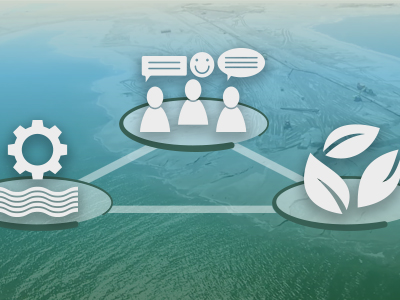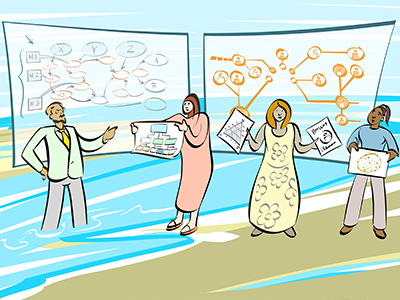Overview
Course video
Learn how to use ecological and engineering design principles to develop more effective and sustainable hydraulic infrastructure.
If you're interested in the concept of building with nature, then this is the engineering course for you. This course explores the use of natural materials and ecological processes in achieving effective and sustainable hydraulic infrastructural designs. You will learn the Building with Nature ecosystem-based design concept and its applications in water and coastal systems. During the course, you will be presented with a range of case studies to deepen your knowledge of ecological and engineering principles.
You'll learn from leading Dutch engineers and environmental scientists who see the Building with Nature integrated design approach as fundamental to a new generation of engineers and ecologists.
Join us in exploring the interface between hydraulic engineering, nature and society.
What you'll learn:
- Basic engineering design principles, and basic ecological principles, relevant to the Building with Nature approach
- How to assess which principles are applied in several case studies and so form your own opinion on whether the hydraulic infrastructure is meeting engineering, ecosystem and societal goals
- How to apply your new knowledge in assessing the potential for Building with Nature solutions where you live
Details
Course Syllabus
Week 1: Introduction to Building with Nature
Introduction to the Building with Nature concept and its importance through a number of dramatic examples. Identifying hydraulic engineering infrastructures, and exploring the diversity of standpoints on their ecological effects.
Week 2: Engineering design principles
The engineering design process is explained and the underlying principles are distilled. Students familiarize themselves with the material through classification exercises.
Week 3: Ecological design principles
The concept of designing in accordance with ecological principles is explained. Students identify different types of aquatic ecosystems and distill principles on the basis of ecosystem character and functioning.
Week 4: Integrated design
Students apply their new knowledge in assessing the potential for Building with Nature solutions in case studies, or in their locality. Trade-offs in applying engineering and ecological principles are explicated, and the opportunities for nature are clarified.
Week 5: Integrated design review
Critical evaluation of whether hydraulic infrastructure is fit for purpose in meeting engineering, ecological and societal goals by peer reviewing case studies from week 4. In particular, students assess the coherence between the infrastructure design and the ecosystem character and function.
License
Unless otherwise specified, the Course Materials of this course are Copyright Delft University of Technology and are licensed under a Creative Commons Attribution-NonCommercial-ShareAlike 4.0 International License.
Qualifications
Chartered Engineering Competences
All our online courses and programs have been matched to the competences determined by KIVI’s Competence Structure, a common frame of reference for everyone, across all disciplines, levels and roles.
These competences apply to this course:
- A1: Extend your theoretical knowledge of new and advancing technologies.
- B3: Manage implementation of design solutions, and evaluate their effectiveness.
- E3: Undertake engineering activities in a way that contributes to sustainable development and a circular economy.
Admission
This is a Massive Open Online Course (MOOC) that runs on edX. Analytical ability and basic physics will be helpful, as are an affinity for coastal and water systems and an interest in ecosystem-based engineering.

